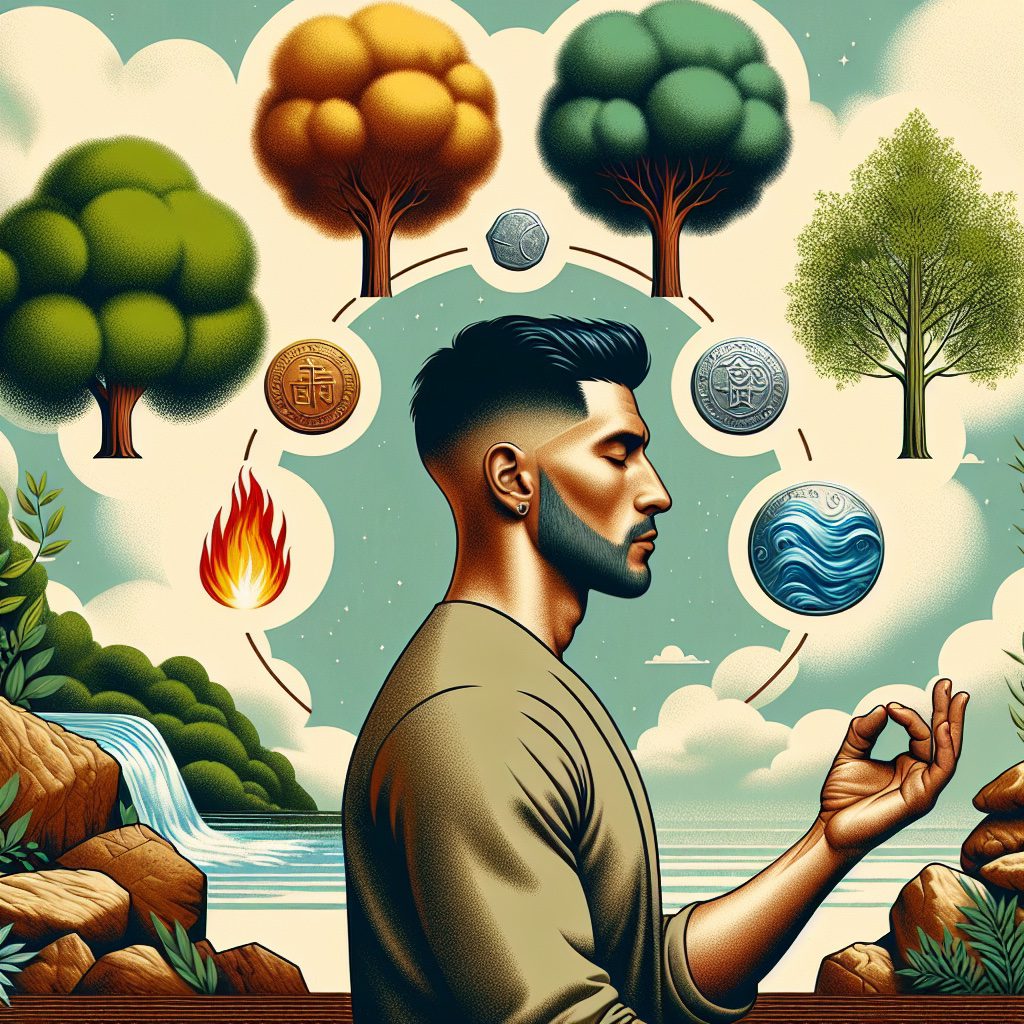Have you ever found yourself rushing from one meeting to another, scrolling through emails while gulping down lunch, only to collapse exhausted at day’s end wondering if there’s a better way to live? You’re not alone. In our hyper-connected world of endless notifications and growing environmental concerns, many of us are seeking a path that allows us to thrive personally while respecting our planet’s limits.
What if I told you that wisdom dating back thousands of years might hold the key to this modern dilemma?
Ancient Eastern philosophies have long embraced principles that naturally align with what we now call sustainable living. These traditions offer profound insights into living fully while treading lightly on Earth—a balance that feels increasingly urgent in today’s world.
Finding Balance in a World of Extremes
Lisa, a marketing executive from Chicago, described her awakening moment: “I was succeeding at work but failing at life. My apartment was cluttered with things I barely used, my schedule was packed with commitments that didn’t fulfill me, and despite my concerns about climate change, my lifestyle didn’t reflect my values.”
Like Lisa, many of us find ourselves caught between our desire for personal wellbeing and our responsibility to the planet. We want fulfilling careers, meaningful relationships, and rich experiences, but not at the expense of our health or environment.
Ancient Eastern wisdom offers a framework for navigating this tension—teaching that personal flourishing and planetary care aren’t competing priorities but interconnected aspects of a balanced life.
The Balanced Living Philosophy: Harmony Between Self and Environment
Eastern philosophical traditions like Buddhism, Taoism, and Traditional Chinese Medicine share a fundamental view: humans are not separate from nature but integral parts of it. This perspective naturally fosters sustainable living inspired by traditional Eastern values.
“The concept of interconnectedness is central to Eastern philosophy,” explains Dr. Mei Zhang, professor of Eastern Studies at Columbia University. “What affects one part of the system affects the whole. When we harm the environment, we ultimately harm ourselves.”
This understanding manifests in several core principles:
Mindfulness and Presence
Eastern traditions emphasize being fully present in each moment. This mindfulness naturally counteracts our culture’s tendency toward mindless consumption. When we pay attention to how we feel while using or consuming something, we naturally gravitate toward quality over quantity.
Consider how often we purchase things impulsively, chasing a momentary dopamine hit rather than lasting satisfaction. Mindful consumption encourages us to ask: “Do I really need this? Will it truly enhance my life?”
Minimalism and Intentional Living
Long before Marie Kondo became a household name, Eastern monastics were practicing minimalism as a path to clarity and peace. The Japanese concept of “ma”—appreciating the space between objects—reminds us that emptiness has value. In practical terms, this translates to homes with fewer, more meaningful possessions and lives with margin rather than constant busyness.
Michael, a software developer who embraced these principles, shares: “I used to equate success with accumulation—the bigger house, newer car, more clothes. Studying Eastern philosophy helped me realize that beyond basic needs, wellbeing comes from experiences, relationships, and purpose, not things.”
Conservation and Reverence for Resources
Eastern traditions teach reverence for all resources. In Japan, the concept of “mottainai” expresses regret at waste, seeing the inherent value in objects beyond their immediate utility. This attitude naturally promotes practices like repairing instead of replacing, composting food scraps, and using every part of plants and animals when consumed.
These principles offer a refreshing alternative to our current consumption-driven society, suggesting that sustainable living isn’t about deprivation but about finding deeper satisfaction through intentional choices.
Drawing Inspiration from Traditional Eastern Values
Eastern wisdom extends beyond philosophical concepts to practical traditions that enhance both personal wellbeing and environmental sustainability.
Community and Collective Care
Eastern cultures traditionally emphasize community interdependence over Western individualism. This manifests in practices like shared resources, multigenerational living, and community decision-making—all of which reduce environmental impact while enhancing social connection.
Studies show that strong community bonds correlate with both increased happiness and reduced consumption. When we feel connected to others, we’re less likely to seek fulfillment through material goods.
Ethical Living and Right Relationship
Eastern traditions like Buddhism promote ethical principles such as non-harm (ahimsa) and right livelihood—making a living in ways that don’t harm others. Applied to modern life, these principles might guide us toward supporting ethical businesses, choosing plant-based meals more often, or considering the full supply chain behind our purchases. Buddhism’s emphasis on mindful consumption offers valuable guidance for today’s ecological challenges.
“Eastern ethics don’t separate personal virtue from ecological impact,” notes environmental ethicist Dr. James Chen. “Caring for the Earth is seen as a natural extension of caring for oneself and others.”
Health and Well-being Practices
Perhaps most accessible are Eastern wellness practices that simultaneously benefit personal health and environmental sustainability:
Meditation and Mindfulness: Regular meditation not only reduces stress and improves mental health but often leads practitioners to consume more mindfully and find satisfaction in non-material experiences.
Yoga and Movement Practices: These traditions connect body awareness with natural rhythms, helping practitioners feel their connection to the natural world while improving physical health.
Seasonal Eating: Traditional Chinese Medicine emphasizes eating foods appropriate to the season and local environment. This approach naturally reduces the carbon footprint of our diets while providing optimal nutrition for our bodies’ changing seasonal needs.
Sarah, a nutritionist who incorporates seasonal eating principles with her clients, explains: “When we eat locally and seasonally, we’re not just reducing food miles. According to Eastern wisdom, we’re also consuming foods when they contain the specific energetic properties our bodies need during that time of year. Winter roots ground us, spring greens detoxify, summer fruits cool us—it’s an intuitive system that benefits both body and planet.”
Bridging Ancient Wisdom with Modern Sustainability
The beauty of Eastern wisdom lies in its adaptability. These ancient principles aren’t rigid dogmas but living traditions that can inspire innovative solutions to contemporary challenges.
Consider the growing movement of “eco-minimalism,” which combines Eastern minimalist aesthetics with environmental consciousness. Practitioners create homes that are both beautiful and sustainable through thoughtful consumption, natural materials, and energy-efficient design.
Or look at the resurgence of traditional preservation methods like fermentation, which reduces food waste while creating nutrient-dense foods that support gut health—aligning ancient practices with modern nutritional science and sustainability goals.
Even technology companies are finding inspiration in Eastern concepts. Some meditation apps now include features that help users track their consumption habits or make more environmentally friendly choices, bridging ancient mindfulness practices with modern environmental concerns.
Urban planners are increasingly incorporating Eastern design principles like biophilia (connection to nature) and community-centered spaces, creating cities that support both human wellbeing and ecological health.
These examples show how ancient wisdom can inform rather than reject modern innovation, creating a harmonious integration of timeless principles with contemporary needs.
Your Personal Path to Balance and Sustainability
Living fully while treading lightly isn’t about perfection or adopting an entirely new cultural framework. It’s about finding inspiration in time-tested wisdom and adapting it to your unique circumstances.
Consider starting with these simple practices inspired by Eastern traditions:
- Begin your day with five minutes of mindful breathing, setting an intention to remain aware of your connections to others and the Earth
- Before making purchases, pause and consider whether the item will truly enhance your wellbeing
- Explore seasonal eating by visiting farmers markets and learning which foods naturally grow in your region during each season
- Create small spaces for contemplation in your home with minimal clutter and natural elements
- Practice gratitude for the Earth’s resources each time you use water, electricity, or consume food
Remember that in Eastern philosophy, the journey toward balance is itself the destination. Each mindful choice creates ripples of positive change, both within yourself and in the wider world.
As the ancient Taoist philosopher Lao Tzu wisely observed: “Nature does not hurry, yet everything is accomplished.” Similarly, sustainable living inspired by traditional Eastern values doesn’t require dramatic overnight transformations but rather a gradual alignment of daily choices with deeper wisdom.
The path to living fully while treading lightly emerges from understanding the fundamental principle that guides all Eastern wisdom traditions: everything is connected. Our personal wellbeing is inseparable from the health of our communities and the planet.
By embracing this interconnected perspective, we discover that caring for ourselves and caring for the Earth are not competing priorities but parts of the same harmonious whole. We find that less consumption often means more satisfaction, that slowing down helps us truly experience life’s richness, and that the ancient wisdom of living in accordance with natural rhythms offers a blueprint for both personal fulfillment and planetary healing.
In this balance—this middle path between indulgence and deprivation, between ancient wisdom and modern innovation—we find the secret to living fully while treading lightly on our precious Earth.




